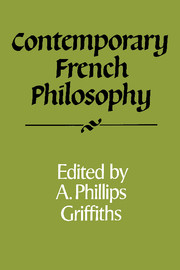Book contents
- Frontmatter
- Contents
- Preface
- Continental Insularity: Contemporary French Analytical Philosophy
- The Misprision of Pragmatics: Conceptions of Language in Contemporary French Philosophy
- Ants and Women, or Philosophy without Borders
- Motifs towards a Poetics
- The Relevance of Cartesianism
- The Enlightenment without the Critique: A Word on Michel Serres' Philosophy
- The Teleological and Deontological Structures of Action: Aristotle and/or Kant?
- The Crisis of the Post-modern Image
- Merleau-Ponty and the Phenomenology of Perception
- Epistemological History: The Legacy of Bachelard and Canguilhem
- History as Genealogy: An Exploration of Foucault's Approach to History
- Beyond Deconstruction?
- Further Adventures of the Dialectic: Merleau-Ponty, Sartre, Althusser
- Paradoxes of the Pineal: From Descartes to Georges Bataille
- Notes on Contributors
- Index
Continental Insularity: Contemporary French Analytical Philosophy
Published online by Cambridge University Press: 25 May 2010
- Frontmatter
- Contents
- Preface
- Continental Insularity: Contemporary French Analytical Philosophy
- The Misprision of Pragmatics: Conceptions of Language in Contemporary French Philosophy
- Ants and Women, or Philosophy without Borders
- Motifs towards a Poetics
- The Relevance of Cartesianism
- The Enlightenment without the Critique: A Word on Michel Serres' Philosophy
- The Teleological and Deontological Structures of Action: Aristotle and/or Kant?
- The Crisis of the Post-modern Image
- Merleau-Ponty and the Phenomenology of Perception
- Epistemological History: The Legacy of Bachelard and Canguilhem
- History as Genealogy: An Exploration of Foucault's Approach to History
- Beyond Deconstruction?
- Further Adventures of the Dialectic: Merleau-Ponty, Sartre, Althusser
- Paradoxes of the Pineal: From Descartes to Georges Bataille
- Notes on Contributors
- Index
Summary
Sociological–Cultural Remarks
People outside France have always wondered why analytical philosophy has had so little influence in this country, while it has gained currency in many other European countries, such as Germany and Italy, not to speak of Northern Europe, where the analytical tradition is strongly established. This can be explained only by a particular conjunction of historical, cultural, sociological and maybe economical factors, which it would be too long to detail here. If there are natural characters of nations, there is no reason to believe that there are no philosophical characters of nations. As Hume said, the characters of nations can have physical as well as moral causes. As for the physical causes, everybody in Britain knows how insular the Continent can be. So if there is such a thing as French analytical philosophy, nobody will be surprised to learn that it is very insular. Before presenting some of the work done by French philosophers related to the analytical tradition, let me try to give what I take to be some of the moral causes of their insularity.
Among the more familiar reasons of the separation between the Anglo-American analytical tradition and the French tradition in philosophy, are some historical features of these traditions. One of them is the fact that logic has always been in France a minor and neglected discipline. Descartes is largely responsible for that, in spite of the influence of Port Royal.
- Type
- Chapter
- Information
- Contemporary French Philosophy , pp. 1 - 20Publisher: Cambridge University PressPrint publication year: 1989
- 5
- Cited by

